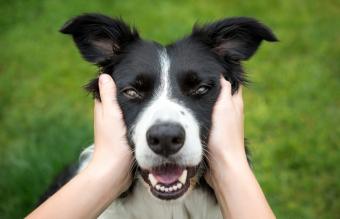
The French Bulldog, fondly referred to as the frenchie, makes a positively delightful companion for the family that can provide plenty of attention. These dogs do have some care requirements and possible health concerns that future owners should be aware of. Is a frenchie the right dog for your household?
History and Origin of the Breed
Interestingly enough, the lovable frenchie started out as a miniature version of the stalwart English Bulldog around the mid-1800s in Nottingham. These dogs were bred down to a more companionable size, and along the way they were brought to France by lace workers. The frenchie, then called Bouledogue Francais, grew in popularity and were reportedly kept as pets in Parisian bordellos.
Recognizing the mini bulldog's wonderful attributes, the French breeders quickly imported specimens they crossbred to French Terriers. This crossbreeding resulted in the modern French Bulldog. The breed made its way to the United States in 1885 where it was dubbed the frenchie. The American Kennel Club (AKC) recognized the French Bulldog as a distinct breed in 1898.
Characteristics of the French Bulldog

Sturdy and adorable are two words that immediately come to mind when looking at a frenchie. These dogs have several distinguishable characteristics.
Appearance
The French Bulldog's head is reminiscent of their English Bulldog heritage and is fairly square. The muzzle is very broad but short, a set of traits that is referred to as brachycephalic. The nose tilts slightly upward, and the jaw is mildly undershot. A frenchie's eyes are full, round and carry a very warm expression. According to the AKC breed standard, the best specimens show no white in their eyes when looking directly forward.
The ears are one of the most distinguishing characteristics of this breed. Unlike the English Bulldog, the French Bulldog's ears are erect like a bat's. They are broad, rounded, and set at 10 and two o'clock for a slightly angled appearance.
The breed's neck is rather broad and short, and it tapers into shoulders that are broader than the rear quarter. Their chest is also wide with good depth, but not as broad as the English Bulldog. The tail is little more than a stub.
The average height of this breed runs about 12 inches at the shoulder. Frenchies typically weigh anywhere from 20 to 28 pounds. The coat is very short. Breed standard acceptable colors include the following.
- Brindle (with or without white)
- Fawn
- White
- Any other color that is not on the unacceptable list
There are additional common but disqualifying AKC colors.
- Solid black
- Black and tan
- Black and white
- Liver
- Mouse grey
Temperament

As cute as the French Bulldog is, it's the breed's personality that truly stands out. These dogs are lovable clowns that want to amuse you. This is understandable, considering they were bred for companionship rather than performance. That's not to say they are without intelligence, as these dogs can be quite clever. They can also display considerable stubbornness.
While not exactly a nuisance barker, these dogs can be quite vocal. They require a good deal of personal attention. Some dogs are prone to attaching themselves to a favorite person, so good socialization is a must. Begin with a basic puppy class and follow with a basic obedience course when the dog is old enough.
Exercise Requirements
The breed's exercise needs are somewhat lower than other breeds. However, daily walks are necessary to stave off excessive weight gain. Aim for about an hour of physical activity each day, broken into several short sessions. These dogs are at risk for overheating and breathing difficulty due to their short airway, so they shouldn't overexert themselves.
Training

These dogs may be difficult to train because of their silliness and headstrong personalities, so you need patience and persistence when training a French Bulldog. Frenchies do not respond well to heavy-handed tactics and shouting. Doing so will result in a very sulky pet who is no longer listening to you.
Clicker training is one approach that more owners are finding especially effective with this breed. This form of training builds on successes rather than administering punishment for failures.
Health Concerns
The French Bulldog is prone to several potential health issues.
- Eye problems: They're at risk for ocular issues, including cataracts, cherry eye, or entropion. The eyes are also prone to injury and infection.
- Allergies: These dogs commonly have environmental or food allergies.
- Skin problems: Because of the many folds on their faces, frenchies are prone to skin fold dermatitis within the creases.
- Brachycephalic syndrome: Any animal with a short muzzle is at risk for a set of breathing problems known as brachycephalic syndrome. These include an elongated soft palate and stenotic nostrils, among others. Some frenchies need surgery in order to breathe comfortably.
- Intervertebral disc disease (IVDD): IVDD is a degenerative spine condition that the breed is genetically predisposed to.
- Palate deformities: Like other brachycephalic breeds, frenchies can be born with a cleft palate, which needs surgery to correct.
- Hip dysplasia: This developmental problem can lead to painful and arthritic hips. It's more common in large breed dogs, but smaller dogs like frenchies can be genetically predisposed.
- Obesity: Frenchies are at risk for weight gain, which can lead to breathing problems, arthritis, among other issues.
- Reproductive challenges. Most French Bulldogs cannot mate naturally due to their body structure, so artificial insemination is usually necessary. A substantial number of frenchie litters must also be delivered by C-section.
Lifespan
French Bulldogs live an average of 10 to 12 years, though the oldest recorded frenchie was more than 14 years old.
Grooming Needs
The French Bulldog's short coat actually requires very little care, though these dogs are medium shedders. Regular brushing is required to prevent loose hairs from collecting on clothing and furniture. A monthly bathing is usually sufficient.
However, the folds of flesh around the face should be wiped clean on a daily basis to prevent buildup or irritation. This is easily accomplished with the use of a pet wipe. Special attention should also be paid to keeping the prominent eyes free of mucus and other debris.
Ears should also be checked and cleaned periodically. Their upright setting promotes better than average air flow, but ear infections can be a common occurrence with this breed. The nails have a tendency to grow rather quickly. They should be trimmed or dremeled back regularly.
Fun Facts About the Breed

- The French Bulldog continuously ranks in the top five of the AKC's Most Popular Dog Breeds.
- The breed cannot swim. In fact, they risk drowning in water due to their front-heavy body structure.
- Numerous celebrities own frenchies, including Lady Gaga, Michael Phelps, Snoop Dogg, and Reese Witherspoon.
- This breed is notorious for snoring, so if you're a light sleeper you might not want to allow your frenchie in the bed!
Where to Buy or Adopt a Frenchie
If you'd like to bring one of these charismatic dogs into your family, you can search for an adult or frenchie puppy. You'll likely pay anywhere from $2,000 to $6,000 for a well-bred French Bulldog puppy. This breed is priced higher than others because they usually require artificial insemination and a C-section surgery, which are both expensive procedures, in addition to genetic screening tests.
The French Bulldog Club of America offers a breeder referral service where future owners can find reputable breeders. Breeders must complete certain criteria, such as providing their health guarantee, in order to be listed in this directory. The AKC Marketplace is also a popular place to locate available frenchie litters. Always do your own research to find a responsible breeder.
Adopting a French Bulldog may be an option, as well. Typically, frenchies in need of homes are adults, but puppies can also come up for adoption. Sometimes these pups are relinquished due to extensive health problems their owners may not have the funds to treat. Find adoptable dogs through one of several frenchie rescue organizations.
Is the French Bulldog Right for You?
If you've fallen in love with the frenchie's adorable looks and independent personality, you might be ready to bring one into your household. French Bulldogs make excellent pets, but you should be prepared to provide them with the extra (sometimes costly) care and medical attention this breed requires.







